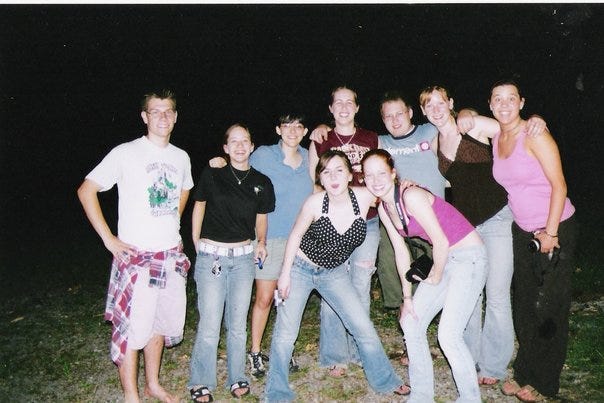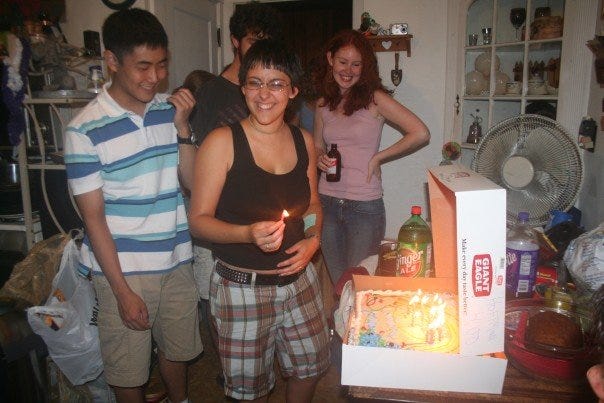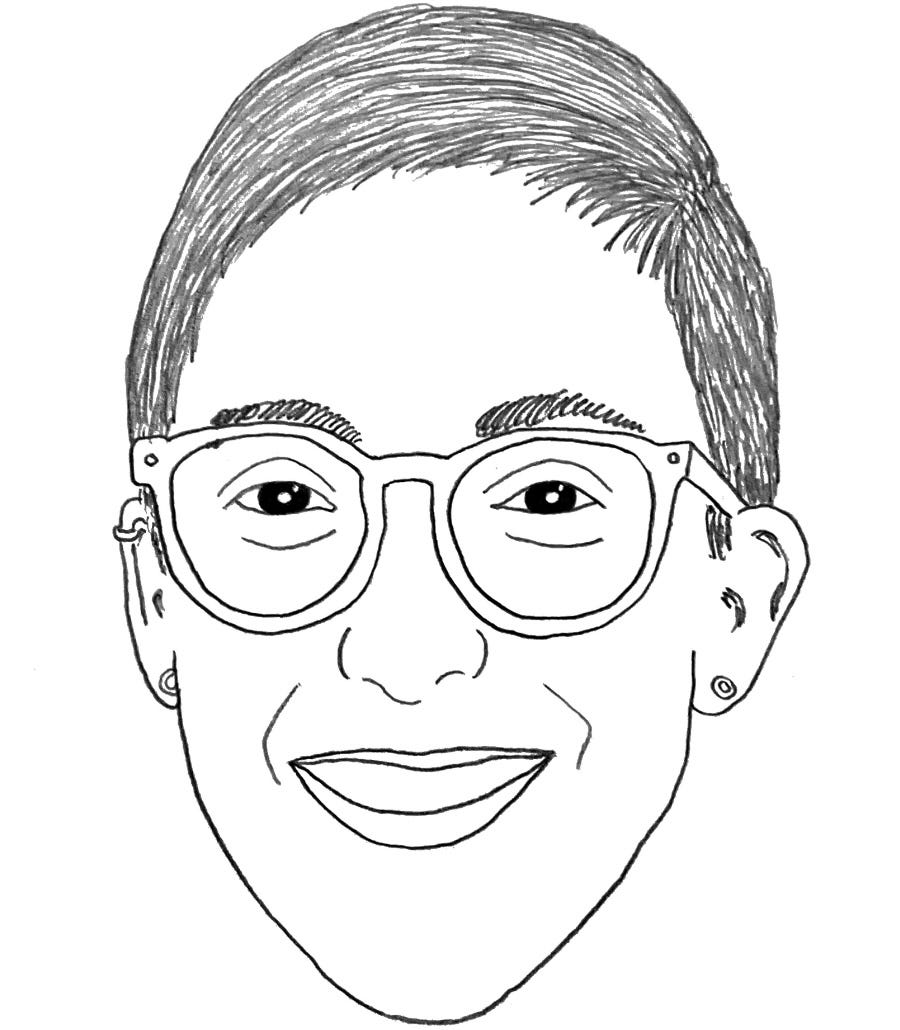No. 062 - Ani DiFranco’s “Evolve” changed my life
Yonina Hoffman takes us back to 2004 and talks 20 years of evolution
This Song Changed My Life is an independent music publication featuring essays from people all around the world about the songs that mean the most to them. Created by Grace Lilly, supported by readers.
• 5 min read •
The things that change our lives often come out of nowhere. I don't remember how I discovered Ani DiFranco, for instance — my parents listened to the Spin Doctors, Joni Mitchell, James Brown, and classical. Maybe it's better that I don't remember how I found her: it's like a tiny mutation in an enormous system that only matters in retrospect — the difference that makes a difference, visible only from afar.
I do know that I responded to her syncopation, her heartfelt lyrics. The finger-picking complexity of her guitar lines, her percussive slaps on the instrument’s body. Her guttural voice pitching upward to warbled vibrato when she sings that she’s “trying to evollllllllve.” It felt like what it was like to be, inside me. So when I saw that Ani was going to be playing a concert nearby, I jumped at it. It was early December 2004, and I was a high school senior in West Virginia. I invited my boyfriend of 3 weeks, at the beginning of a relationship that would last for almost 20 years.
In the dimly lit auditorium, I remember dancing in my seat, more a series of rhythmic, spasmodic jerks really. My instinct early on was to dance the music, rather than dance to the music — that is, I tried to mediate the song in my body rather than move my body in response. I knew at the time that my dancing was weird — and I remember watching my boyfriend out of the corner of my left eye to see how he would react. He didn't seem to mind, amazingly, and I felt myself melt into comfort with him, this boy who seemed to see me whole and accept every strange, wonderful part. The concert was great, and afterwards, in the secluded small lot across the way, we had joyous, fumbling sex for the first time in the back seat of his car.
Every young person knows what it’s like “trying to evolve” — struggling to decide, to create, who you are going to be. It’s like in the song when there’s a guitar riff of full syncopated wildness and then the guitar drops out, and in the break, Ani begins to wail. Youth is like that. You beat yourself against a lightbulb like the Woolfian moth in the song’s first verse, wailing, and then you step back and find yourself living in a groove you didn’t know was there, and the polyrhythm of living finds its way.
Figuring out my sexuality was like that too. My partner saw my queerness before I did, asked me about it, made space for me to explore it (and we stayed non-monogamous to the end). I began to realize that I was sort of gay, yes, but I was also in love with this person who didn't look like a woman. And I didn't care. His person, the way he loved me and saw me and urged me to think and feel and question, mattered more than anything else. As Ani sings on her new album, “I’m not he or she or they / I’m not gay or bi or straight / I’m just me and maybe / that’s just another thing to say.” I remember feeling sympathy for Ani when she married a man, outraging lesbians everywhere. Love is more complicated than orientations, I knew. I’m just me — the me beyond all definition that my partner recognized, and loved. We were “gunnin’ for a high score in the land of dreams.”
I stopped listening to Ani after a while — moved on to other things, like Death Cab for Cutie, Interpol, Broken Social Scene, Battles, Andrew Bird. But I kept evolving in my queerness. It took a while, of course: evolution doesn't happen all at once. I remember moments in the flow, the punctuated equilibrium of it all — like the moment of deciding to myself on my dad’s porch, wearing the same blue ribbed Old Navy tank I'm wearing now as I write this essay, “Maybe I'm bisexual.” It was the first rather than the last act of self-naming, but I will never forget the solidity I felt amidst the ephemeral pileup of selfhood: I will figure myself out; it is possible; self-knowledge is hard-won and worth it. Ani was with me in that. She is still with me in that.
It's been almost 20 years since I heard “Evolve” live in West Virginia, at 16 years old. Life changes underneath you, small changes ramify: and my partner and I, I thought bonded for life, just broke up. It was some Unprecedented Shit (incidentally, the title of Ani’s new 2024 album). But only unprecedented to me — she sang it from the start in 1990’s “Both Hands,” her debut’s lead track: “I am getting nowhere with you / and I can’t let it go / and I can’t — get — through.” Oh, that characteristic polyrhythm, from quick 8th notes to a slow halting triplet, leading into the break! Ani is helping me find that triplet, how to let go, how to enter the break. And she’s helping me remember that love means fighting for yourself, as she growls, “I got a lot of heart / but I can’t afford to let it bleed” in Unprecedented Shit’s surprisingly St. Vincent-esque title track. Evolution doesn’t happen without pressure, without hurt, that forces you to defend (and, inevitably, change) your very sense of self.
I have never lived in the past. My memories come unreliably partial, kernels of time with edges washed to oblivion. But now that I have to evolve again, I’m returning to my past self’s listening, and seeing again the emotional work in Ani’s songs — the grief, the love, the fearless shamelessness, the groundedness in what’s right and good. I see also her willingness to call out the bad, in herself and the world. Amid the mess of things, we “got more and more to do” and “less and less to prove.” She got a lot right. ◆
Categories
Friendship • Family • Coming of Age • Romance • Grief • Spirituality & Religion • Personal Development
Recommended
Top 10 • Grace's Favorites • Secret
About Yonina
Yonina Hoffman is an Assistant Professor at the United States Merchant Marine Academy, teaching writing and literature, and researching the structures of novels. Yonina thinks a lot about the rhythmic structures of books, plays the drums sometimes, and is constantly listening to new music, especially shoegaze, indie rock, IDM, and post-rock/post-punk.
Instagram @yonina9
Website yoninahoffman.com
⭐ Recommended by
Diana Filar (No. 054)
Every TSCML writer is asked to recommend a future contributor, creating a never-ending, underlying web of interconnectivity 🕸️
If you enjoyed this post, “like” it & leave a comment 🧡
An average concert ticket costs $122.84 🎟️
An annual subscription to This Song Changed My Life costs less than half of that ($50 to be exact).
Become a paid subscriber
Chipping in helps ensure the continued existence of TSCML — plus you’ll instantly unlock 30+ secret, paid-only posts (and counting).
People love it
What paid subscribers are saying
“I love this series! Want to pitch in so you can keep up the high quality content”
“Happy to support the good stuff”
“I believe watching your work develop will by itself change my life”
October 2024 ∙ Paid 🔒
Bad to the Bone Playlist 😈
Music for your mischievous side. Listen→
If you like this publication and want to learn more about me and my other projects, check out my personal newsletter, Weirdly Good <3
What song changed your life?
You, yes you! If you’d like to participate in This Song Changed My Life, just fill out this simple form for consideration. I’m always looking to hear people’s stories.
Explore
As a teen, Paul Smirl's synesthesia led him to chase down colorful sounds he could see — No. 061 - John Frusciante’s “My Smile Is a Rifle” changed my life
The song that reminds Morgan Wessner that she carries angels within — No. 060 - Koven's “Gold” changed my life










